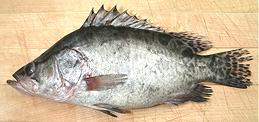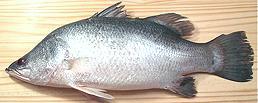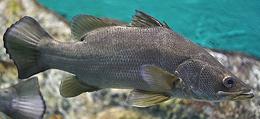Walleye
 [Yellow Pike, American Zander, Sander vitreus |
similar Sandre Canadien, Sand pickerel; Sander canadensis]
[Yellow Pike, American Zander, Sander vitreus |
similar Sandre Canadien, Sand pickerel; Sander canadensis]
Pronounced "Wally", this largest member of the true perch family in
North America and can grow to 42 inches and 25 pounds, but the photo
specimen was 18-1/2 inches and 2-3/4 pounds. This freshwater fish is
found in the great lakes and in most major rivers in the Northeast of
the U.S. and Canada. It is found in the Mississippi river basin as far
south as Arkansas. Commercial aquaculture is in the development stages
but large numbers are hatched for restocking lakes and rivers.
Red List status "Not Evaluated".
Details and Cooking.
Zander
 [Pike Perch, Jack Salmon; Sander lucioperca |
very similar - Volga Pikeperch; Sander volgensis]
[Pike Perch, Jack Salmon; Sander lucioperca |
very similar - Volga Pikeperch; Sander volgensis]
This elongated perch is native to Eastern an Central Europe, Sweden,
Finland and Western Asia, but has been introduced into England and other
countries as a popular angling fish. It can grow to 39 inches and 44
pounds, but is commonly around 20 inches and is considered a very good
eating fish. Red List status is "Least Concern". Restaurants in Minnesota
have been busted for serving imported Zander as Walleye
(from which it is indistinguishable on the plate), so see Walleye for
Details and Cooking.
Photo by Elnuko contributed to the Public Domain.
Yellow Perch
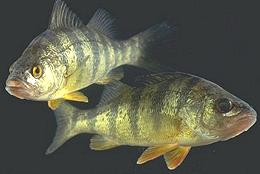 [Perca flavescens]
[Perca flavescens]
This North American native lives mainly in northern lakes and rivers,
but a few are found as far south as South Carolina. It can grow to
nearly 20 inches and 4-1/4 pounds, but is commonly quite a bit
smaller. Red List status "Not Evaluated".
Photo by U.S. Department of Agriculture = public domain.
Egli / European Perch
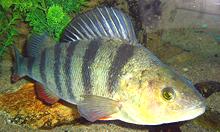 [Perca flaviatilis]
[Perca flaviatilis]
Very similar to the North American Yellow Perch, but not yet proven to
be the same species. This perch infests the ponds, rivers and streams
of Europe and most of Siberia, except Spain and Italy which are too
warm for it. In Europe they grow to about 10 pounds, but they have been
introduced to New Zealand and Australia where the record is 23 pounds.
They are commonly marketed at around 10 inches. Considered an excellent
eating fish, caught wild and farmed. IUCN rated LC (Least Concern).
Photo by Dgp.martin distributed under license
Creative
Commons Attribution 3.0 Unported..
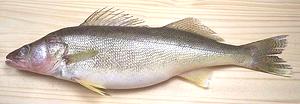 [Genus Perca species; also Latidae (Lates perches)]
[Genus Perca species; also Latidae (Lates perches)]
